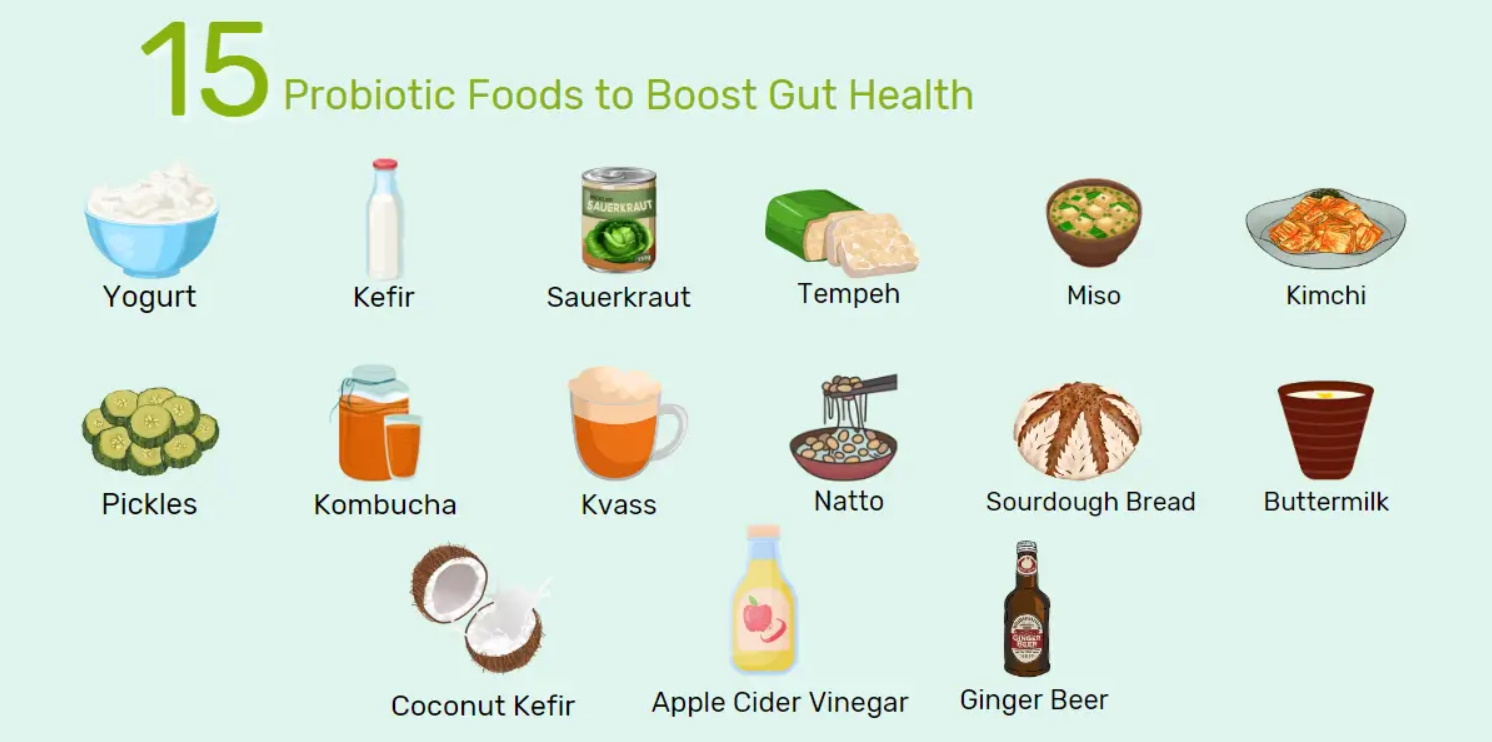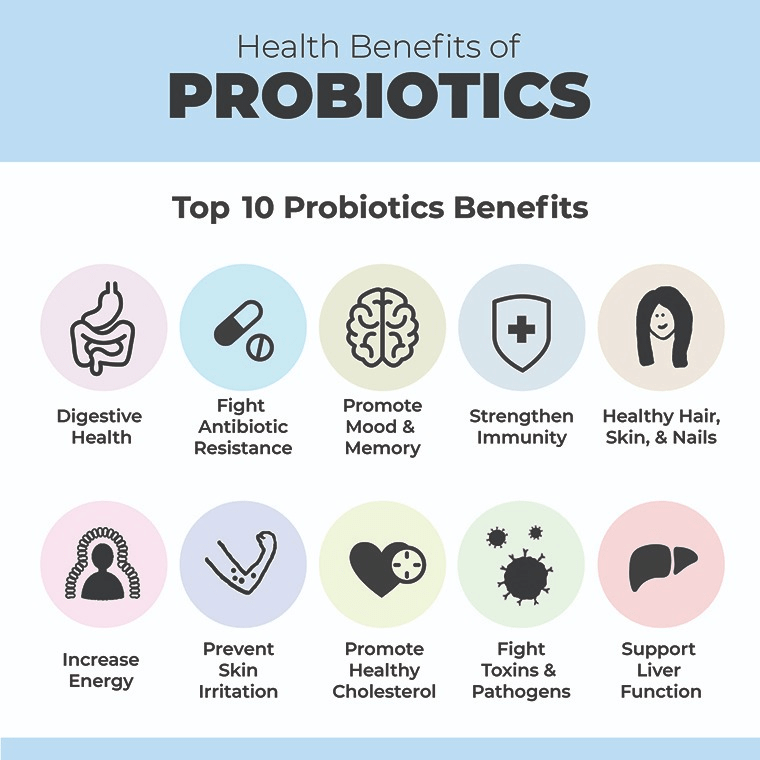Introduction to Probiotics and Their Role in Weight Loss

Probiotics are live microorganisms, typically bacteria or yeast, that are similar to the beneficial microorganisms found naturally in the human gut. They are often referred to as “good” or “friendly” bacteria and are widely recognized for their health benefits. Consumed through certain foods or supplements, probiotics can help balance the gut microbiome, which is crucial for overall health. They are known to enhance digestive health, boost immune function, and may even have effects on mental health through the gut-brain axis. An overview from Healthline.
Understanding Probiotics

Definition of Probiotics and Their Main Types: Probiotics are live microorganisms that, when administered in adequate amounts, confer a health benefit on the host. Essentially, they are the good bacteria that support the natural balance of organisms in the intestines. The two main types of probiotics are Lactobacillus and Bifidobacterium. Lactobacillus is commonly found in yogurt and other fermented foods and is particularly helpful in digesting lactose and preventing diarrhea. Bifidobacterium resides in the colon and is beneficial in supporting the immune system and limiting the growth of harmful bacteria.
How Probiotics Work in the Human Body: Once ingested, probiotics populate the gastrointestinal tract and work to restore the natural balance of gut flora, which can be disrupted by factors like antibiotics, poor diet, and stress. These beneficial bacteria compete with harmful bacteria for nutrition and attachment sites, effectively inhibiting the growth of pathogens. They also contribute to the integrity of the gut barrier, enhance immune responses, and can influence the body’s metabolism and nutrient absorption.
Overview of Common Sources of Probiotics: Supplements vs. Natural Food Sources: Probiotics are available in two main forms: supplements and natural food sources. Supplements come in various forms including capsules, tablets, and powders, and they often contain a higher concentration of probiotics compared to food sources. Natural food sources of probiotics mainly include fermented foods. Yogurt is the most well-known and widely available probiotic food, often containing strains of Lactobacillus and Bifidobacterium. Other fermented foods include kefir, sauerkraut, kimchi, miso, and tempeh. These foods provide a delicious way to ingest beneficial bacteria that can enhance the health of your gut microbiome. Here’s expert opinion from Everyday Health.
Scientific Basis of Probiotics for Weight Loss
Summary of Research Studies Linking Probiotics to Weight Management: Numerous studies have explored the relationship between probiotics and weight management, with varying results. Research generally indicates that probiotics can have a modest impact on weight loss, particularly when used alongside dietary changes and physical activity. A meta-analysis published in the International Journal of Food Sciences and Nutrition noted that participants using probiotics experienced a statistically significant reduction in body weight, although the effect size was small. This suggests that while probiotics are not a standalone solution for weight loss, they can be an effective component of a broader weight management strategy.
How Probiotics Can Influence Weight: The human gut is home to trillions of bacteria, and the composition of this microbiota can significantly influence body weight and fat distribution. Probiotics help in modulating this gut microbiota, promoting the growth of beneficial bacteria while inhibiting harmful ones. By restoring a healthy balance, probiotics may enhance weight loss and prevent weight gain. Studies have shown that obese individuals often have different gut bacteria compared to their lean counterparts, suggesting that modifying the gut microbiota through probiotics could be beneficial in managing obesity. A systematic review of probiotics influence on weight loss.
Effects on Digestion and Metabolism: Probiotics influence the body’s metabolism by enhancing the digestion of certain nutrients, improving energy extraction from food, and possibly affecting appetite-regulating hormones. For instance, some strains of probiotics are known to impact the levels of hormones such as leptin and ghrelin, which play a role in hunger and satiety. Additionally, by improving intestinal health, probiotics may enhance the gut’s barrier function, reducing the amount of energy extracted from food, which could indirectly contribute to weight loss.
Possible Role in Reducing Inflammation Associated with Obesity: Obesity is often associated with low-grade chronic inflammation, which can contribute to the development of metabolic disorders such as type 2 diabetes and cardiovascular diseases. Probiotics may help reduce this inflammation by improving gut health and modulating the immune response. For example, certain probiotic strains can produce short-chain fatty acids like butyrate, which have anti-inflammatory properties. Reducing inflammation not only helps in managing weight but also in improving overall metabolic health.
Practical Guide to Using Probiotics for Weight Loss

Tips on Choosing the Right Probiotic Strains for Weight Loss: When selecting a probiotic supplement for weight loss, it’s crucial to focus on strains that have shown potential benefits in reducing body fat and managing weight. Research has highlighted several specific strains that may be particularly effective:
- Lactobacillus gasseri: Studies have shown that this strain may help reduce belly fat and overall body weight. It is thought to impact the way fat is absorbed in the gut and might also help in regulating hormones related to appetite and fat storage.
- Lactobacillus rhamnosus: This strain has been studied for its effects on weight loss, especially in overweight individuals. It may influence gut microbiota composition and function in ways that promote weight loss and improve metabolic health.
Guidelines on How to Incorporate Probiotics into a Daily Diet: Incorporating probiotics into your daily diet can be done through supplements or by consuming foods rich in beneficial bacteria. Here are some practical tips for each method:
- Supplements: Take a probiotic supplement as directed on the packaging, typically once a day, either in the morning or right before bed. Taking probiotics at the same time each day can help establish a routine and may improve the effectiveness of the bacteria.
- Fermented Foods: Include a variety of fermented foods in your diet, such as yogurt, kefir, sauerkraut, kimchi, and kombucha. These foods provide a diverse range of probiotics that can help enhance the gut microbiota. Aim to include at least one serving of fermented foods in your diet each day.
Potential Side Effects and Precautions When Using Probiotics for Weight Loss: While probiotics are generally safe for most people, they can cause some side effects, especially when first starting them or when taking high doses. Common side effects include gas, bloating, and mild stomach upset. These symptoms typically resolve as your body adjusts to the increased levels of beneficial bacteria in your digestive system. However, individuals with compromised immune systems or those with serious underlying health conditions should consult a healthcare provider before starting any probiotic supplement.
Integrating Probiotics with Other Weight Loss Methods

How Probiotics Can Complement Dietary Changes and Exercise: Probiotics can play a supportive role in a comprehensive weight loss strategy that includes dietary changes and regular exercise. By improving gut health, probiotics can enhance nutrient absorption and optimize digestion, which can be particularly beneficial when paired with a balanced, nutrient-rich diet. For example, a diet high in fiber works synergistically with probiotics, as fiber serves as a prebiotic that feeds beneficial gut bacteria, thereby enhancing their effectiveness. List of probiotics by Fortune.
Discussing a Holistic Approach to Weight Loss Involving Multiple Strategies: A holistic approach to weight loss considers not just diet and exercise but also the integration of additional factors such as stress management, adequate sleep, and maintaining a balanced gut microbiome. Probiotics are a key part of this holistic approach, as they can help manage and reduce systemic inflammation that is often associated with obesity and metabolic diseases. They also potentially affect mood and energy levels through the gut-brain axis, which can improve motivation and the mental resilience necessary to adhere to a weight loss plan.
Real-life Success Stories or Case Studies: Incorporating case studies or real-life success stories can be very motivating for readers. For instance, a case study might describe an individual who, after struggling with obesity and unsuccessful diets, adopted a holistic approach including probiotics, which led to significant weight loss and improved metabolic health. These stories can illustrate key points about the efficacy of combining probiotics with other weight loss strategies and provide a relatable and inspiring narrative for readers.
Future Directions and Research

Areas Needing Further Investigation and Research for Clearer Conclusions: Despite the promising potential of probiotics for weight loss, several areas require deeper investigation to draw clearer and more definitive conclusions:
- Long-term Effects and Sustainability: Current research often focuses on short-term outcomes. Longitudinal studies are needed to understand the long-term effects of probiotic supplementation on weight loss and overall health.
- Individual Variability: The gut microbiota varies significantly among individuals, influenced by genetics, diet, lifestyle, and more. Research needs to better address how these factors impact the effectiveness of probiotics for different individuals.
- Mechanisms of Action: While it is known that probiotics can influence the gut microbiota and contribute to health, the specific mechanisms through which they affect metabolism and body weight are not fully understood. More detailed studies are needed to elucidate these pathways.
- Optimal Strains and Doses: Identifying which probiotic strains are most effective for weight loss and determining the optimal dosages for these effects are crucial for developing effective supplements.
- Synergistic Effects with Other Interventions: Investigating how probiotics interact with other dietary components, medications, and lifestyle factors could lead to more effective, personalized weight management strategies.
Potential Developments in Probiotic Formulations for Targeted Weight Loss Solutions: Advancements in biotechnology and a better understanding of the human microbiome are likely to lead to innovative developments in probiotic formulations:
- Tailored Probiotic Supplements: Future probiotics may be customized based on an individual’s gut microbiota profile, potentially determined through advanced diagnostics like genetic sequencing. This personalized approach could maximize the effectiveness of probiotics for weight loss.
- Combination Therapies: Probiotics might be combined with prebiotics (compounds that feed beneficial bacteria) to enhance their effects. Additionally, combining probiotics with other natural supplements that promote weight loss could provide a more comprehensive approach.
- Enhanced Delivery Systems: Improvements in how probiotics are delivered to the gut, such as encapsulation technologies that ensure more bacteria survive the acidic environment of the stomach, could improve their efficacy.
- Functional Foods: There may be an increase in the development of functional foods infused with specific probiotic strains that support weight management. These could provide an easier and more appealing way to consume beneficial bacteria as part of a daily diet.
